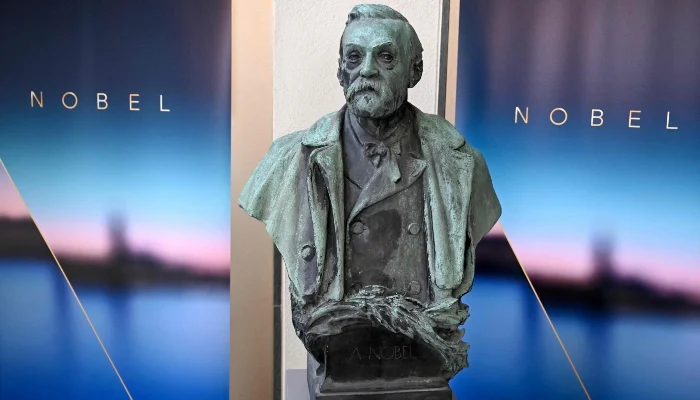Select Language:
A bust of Swedish chemist, inventor, and businessman Alfred Nobel, the founder and namesake of the Nobel Prizes, is shown on October 6, 2025, at the Karolinska Institute in Stockholm, Sweden, just before the announcement of the 2025 Nobel Prize in Physiology or Medicine. — AFP
Stockholm: The upcoming Nobel Physics Prize could recognize groundbreaking achievements such as a mathematical theory that improves computer image compression, the development of an “invisibility cloak,” or the science behind the James Webb Space Telescope. The award, scheduled to be announced at 11:45 am (0945 GMT) in Stockholm, follows the Nobel season’s second honor, after the Medicine Prize was awarded on Monday to a U.S.-Japanese trio for their immune system research. U.S. scientists Mary Brunkow and Fred Ramsdell, along with Japan’s Shimon Sakaguchi, were lauded by the Nobel committee for discovering what they called “immune security guards.”
Experts have speculated that this year’s physics honor might go to wavelet theory. David Pendlebury, who leads research analysis at Clarivate, explained that although the math behind wavelet theory sounds complex, it has significantly impacted everyday life — notably through image and video compression on digital devices. Potential winners include Belgian physicist Ingrid Daubechies, along with French mathematicians Stephane Mallat and Yves Meyer.
Meanwhile, Lars Brostrom, science editor at Sveriges Radio, suggested that the Nobel might recognize work on “metamaterials,” a field that has garnered attention with British scientist John B. Pendry’s famous “invisibility cloak” concept. “We’ve probably discussed these topics in previous years, and now may be the time for the prize,” Brostrom said.
He also mentioned that the researchers involved in the James Webb Space Telescope’s development could be candidates, as their foundational work, some of which dates back decades, culminated in the telescope’s launch in late 2021—a prime example of long-term theoretical research translating into practical achievement. Theories related to quantum information and algorithms are also generating buzz. Hamish Johnston, editor at Physics World, noted that much of this pioneering work from decades ago has now led to functioning quantum computers and secure cryptography systems. Notable figures possibly in line for the award include American mathematician Peter Shor, Canadian cryptographer Gilles Brassard, U.S. physicist Charles H. Bennett, and scientist David Deutsch, who hold critical roles in quantum tech development.
In astrophysics, recent scientific advances are also high on the list. Maria Gunther, a journalist at Dagens Nyheter, suggested that research into galaxy formation might be recognized, highlighting scientists like Mexican-British cosmologist Carlos Frenk, Argentinian astrophysicist Julio Navarro, and British astronomer Simon White. For Physics World, the theory of cosmic inflation—explaining the universe’s exponential expansion shortly after the Big Bang—could be a contender, with American physicist Alan Guth and Russian-American Andrei Linde considered strong candidates.
Additionally, Camilla Widebeck, another science journalist at Sveriges Radio, proposed that the Nobel might award the atomic force microscope, a device capable of capturing three-dimensional images at atomic resolution, which has revolutionized nanotechnology. Swiss physicist Christoph Gerber is often named as a key contributor to this field.
Last year, the Nobel in Physics was awarded to Geoffrey Hinton and John Hopfield for foundational work in artificial intelligence, with both emphasizing the societal and ethical risks of their discoveries. The physics prizes will be followed by the chemistry award on Wednesday, the literature prize on Thursday, and the highly anticipated Nobel Peace Prize on Friday. The Nobel season concludes with the economics award on October 14.
Winners will be honored at a formal ceremony in Stockholm on December 10, receiving a diploma, a gold medal, and a $1 million prize from Sweden’s King Carl XVI Gustaf. December 10 marks the anniversary of Alfred Nobel’s death in 1896— the scientist who established the prizes in his will.







